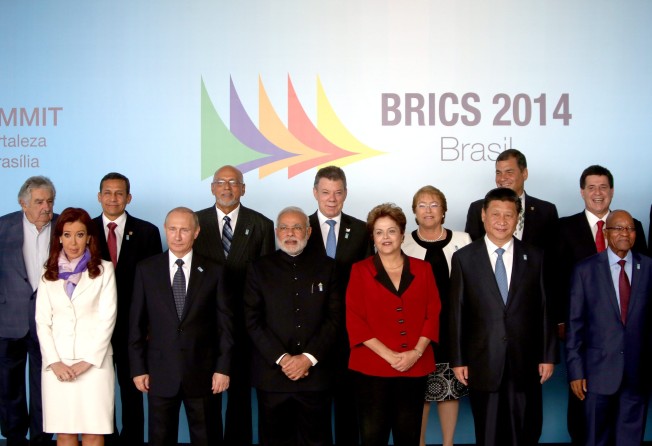BRICS not a firm foundation for a new global economic order
Bloc's development bank cannot challenge Western ascendancy until its leading country China makes transition to a consumer economy

Rarely has an acronym led such a charmed life as BRICS. Casually invented by former Goldman Sachs Group economist Jim O'Neill to label emerging markets of promise, it actually brought together leaders from the disparate countries of Brazil, Russia, India, China and South Africa. Last week in Brazil, they took a decisive step towards building institutions that could plausibly challenge the long geopolitical and economic ascendancy of the West.
The New Development Bank, headquartered in Shanghai, would finance infrastructure and development projects. This would be the biggest rival yet to the World Bank and the International Monetary Fund, as well as the economic architecture designed by the US at Bretton Woods in 1944.
There are good reasons why China is working hard to establish it. The BRICS countries contain more than 40 per cent of the world's population and account for a quarter of its economy. China itself may shortly bypass the US to become the world's biggest economy, based on domestic purchasing power. Yet leadership of the World Bank and the IMF remains the exclusive preserve of the US and Western Europe.
The promised reforms to these institutions have not materialised. China now clearly wants to build its own global system with the help of the BRICS nations.
A new "special relationship" with its closest economic partner in the West - Germany - and the recent establishment of Frankfurt as a clearinghouse for the yuan are part of the same Chinese attempt to break the hegemony of the dollar as a payments and reserve currency.
It is also understandable why China's poor and often resentful BRICS cousins are willing to assist its global self-assertion. India and South Africa need easier access to one of the biggest reservoirs of savings in the world; Russia, ostracised after its annexation of Crimea, seems keen for the respectability of international forums.
Nevertheless, it is far from clear that power, let alone moral advantage, has shifted, as is commonly claimed, from the West to the East.
Russia today displays all the political and economic risks of a parasitic dependence on fossil-fuel exports. South Africa has yet to triumph over the basic Third World problems of corruption and labour unrest. Brazil is stuck with a faltering economy and a disaffected middle class.
The achievements of India in computer hardware and software, or of Brazil in aerospace and defence, are impressive, but they cannot begin to compete with those of the US. Tata Group's highly leveraged takeovers of such iconic companies as Jaguar Land Rover and Corus disguise the failure of even a single Indian brand name to achieve global recognition.
Only China, with its consistently high trade surplus and gross domestic product, seems a convincing rival to the US. It ranks in the top five in a variety of sectors, including banking, insurance, construction, real estate, telecommunications, trading companies and transport.
Still, it's instructive to compare China with Japan, the most serious challenger yet to the West's domination.
Japan became an economic superpower in the days when capital wasn't very globalised. Today, the growth of GDP, an antiquated measure of national economic power, is substantially the work of foreign investors and manufacturers. This is particularly true of the BRICS countries.
It is partly why China still looks to the US as the driver of world economic growth, and Brazil and India grow anxious at the smallest sign that the tap of cheap money will be turned off.
Commodity booms and cheap credit in the 2000s ushered Brazil, India, South Africa and Russia into a period of easy growth. But the financial crisis of 2008 was the first sign that the East's own era of irrational exuberance could not last. The political and economic challenges before the BRICS nations have multiplied since.
Even China, which was not intoxicated by its imminent superpowerdom and possesses more conditions for sustained growth than any other BRICS country, still has to move from investment-led growth to domestic consumption. Until this mammoth task is accomplished, China's own attempt to change the status quo will not work, and the acronym BRICS will continue to denote extravagant ambition rather than genuine ability.
Bloomberg